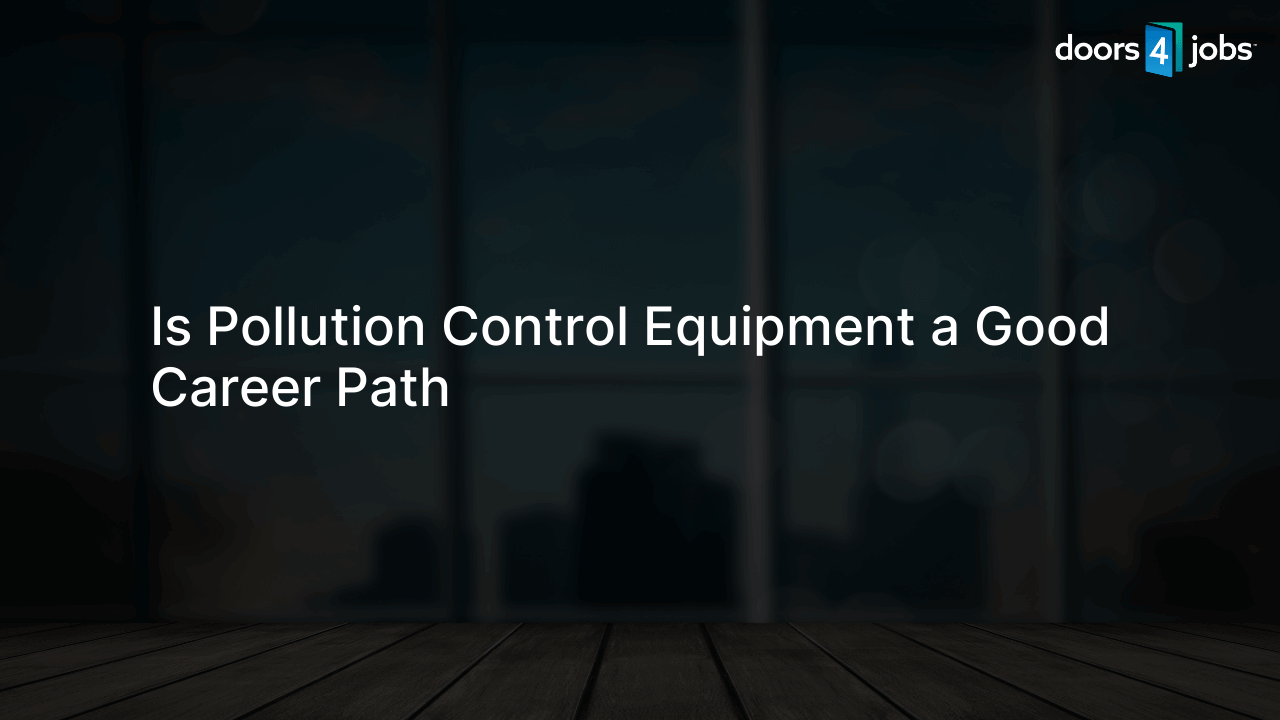Yes, Pollution Control Equipment is a good career path, offering opportunities for growth, job stability and positively impacting the environment. Professionals in this field are responsible for designing, implementing and maintaining systems that reduce pollution, thereby contributing to environmental sustainability and meeting regulatory standards. Demand for such expertise continues to rise, making it a promising career choice.
Overview of Pollution Control Equipment Career Path
Pollution control equipment refers to systems and technologies used to reduce or eliminate contaminants, such as chemicals, particulates, or other harmful substances, from industrial processes and emissions. A career in pollution control equipment can involve roles in engineering, installation, maintenance, and monitoring. It offers the potential for personal fulfillment, environmental impact, and career growth.
Key Skills and Qualifications
1) Engineering Expertise
Professionals in this field usually have backgrounds in environmental, chemical, or mechanical engineering. A bachelor’s or master’s degree in one of these fields is often preferred by employers. Knowledge of specific pollution control technologies and emission regulations is critical for success in this field.
2) Project Management Skills
Individuals working in pollution control equipment must adhere to deadlines and budgets while managing the installation, maintenance, and upgrading processes. These roles often require strong project management skills, including effective communication, time management, and organization.
3) Compliance and Regulatory Knowledge
Understanding of local, national, and international environmental regulations is essential for professionals in this field. They must ensure that their systems meet the required standards and help organizations avoid costly penalties and damage to their reputation.
Job Prospects and Salary Potential
The demand for pollution control equipment professionals is expected to grow due to increasing awareness of environmental issues, stricter regulations, and the need for sustainable industrial practices. As a result, job prospects in this field appear to be promising.
Salaries for these professionals can vary based on experience, education, and location. According to the U.S. Bureau of Labor Statistics, the median salary for environmental engineers in 2020 was $94,220 per year. However, those working in specialized equipment sectors or with extensive experience may earn higher salaries.
Benefits of a Career in Pollution Control Equipment
1) Positive Environmental Impact
One of the most significant benefits of a career in pollution control equipment is the opportunity to contribute to environmental conservation efforts. By developing and implementing effective pollution control systems, these professionals can help improve air quality, reduce waste, and minimize the environmental footprint of industrial processes.
2) Variety and Challenge
This career path offers diverse opportunities across various industries, such as manufacturing, energy, and transportation. Professionals in this field can take on projects ranging from small-scale site evaluations to large, multi-million-dollar installations, ensuring that their work always presents exciting challenges.
3) Steady Job Growth
With increasing awareness of environmental issues and stricter regulations, the need for pollution control equipment professionals is expected to continue growing. This demand suggests long-term job stability and opportunities for career development in this field.
Additional Industries to Explore
While pollution control equipment professionals often work within manufacturing, energy, and transportation sectors, there are several other industries that provide opportunities for growth and exploration. These industries may include:
- Waste management and recycling
- Government agencies and consulting firms
- Environmental NGOs and advocacy groups
- Air and water treatment facilities
- Research and academia
Training and Certifications
Although it is not mandatory, obtaining relevant certifications can boost credibility and help professionals distinguish themselves in the pollution control equipment field. Some beneficial certifications and trainings include:
- Board Certified Environmental Engineer (BCEE) from the American Academy of Environmental Engineers and Scientists
- Certified Environmental Professional (CEP) offered by the Academy of Board Certified Environmental Professionals
- Professional Engineer (PE) License, which may be required or highly desired for some positions
Continuing education courses and workshops focused on new pollution control technologies, regulatory updates, and sustainable practices can further enhance knowledge and skills in the field.
Networking Opportunities
Building a professional network is crucial in any industry, including pollution control equipment. Attending conferences, joining professional organizations, and engaging in online forums can provide valuable networking opportunities, allowing professionals to:
- Stay informed about the latest industry trends and news
- Establish connections with potential employers and clients
- Exchange ideas and experiences with other professionals
- Seek career advice and mentorship
Some prominent pollution control-related organizations and events include the Air & Waste Management Association (A&WMA), the Global Conference on Environmental Studies, and the Water Environment Federation (WEF).
FAQ Section
Readers interested in pursuing a career in pollution control equipment may have additional questions. Find answers to some of the most common queries in our FAQ section below.
What qualifications are required for a pollution control equipment career?
A bachelor’s or master’s degree in environmental, chemical, or mechanical engineering is the typical requirement. However, experience with specific pollution control technologies, a solid understanding of regulations, and project management skills are all essential for succeeding in this field.
Which industries offer job opportunities in pollution control equipment?
Manufacturing, energy, transportation, waste management, government agencies, consulting firms, NGOs, and environmental advocacy groups are some of the common industries with job opportunities in pollution control equipment.
What certifications can enhance the prospects of professionals in this field?
Board Certified Environmental Engineer (BCEE), Certified Environmental Professional (CEP), and a Professional Engineer (PE) license are some of the recommended certifications to enhance credibility and career prospects in this field.
How can I stay updated on the latest trends and technologies in pollution control equipment?
Continuing education courses and workshops, attending conferences, joining professional organizations, and online forums related to environmental conservation are effective methods for staying informed about the industry’s latest trends and advancements.
What is the salary range for professionals in the pollution control equipment field?
The salary range varies based on experience, education, and location. The 2020 median annual salary for environmental engineers was $94,220. Specialists with extensive experience or working in niche sectors may earn higher salaries.











